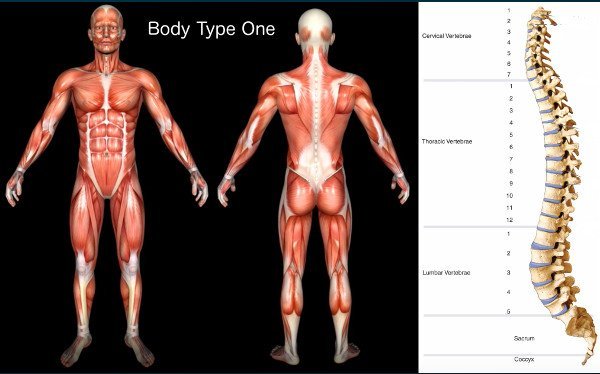
Fellow One Research lead scientific researcher, Marc Nelson, joined the Generation Flip Podcast to discuss Body Type Science (The Four Body Types). Show hosts Flip and Big Brown started things off by asking about current mainstream science and medical body type standards and why they are inaccurate:
- Standard Scientific Human Body Anatomy Book Body Type One (BT1) found in any scientifically approved human body anatomy book. This first standard is inaccurate because it does not recognize that is a genetic fact that any part of the human body can be underdeveloped to whatever
 degree, nor does it give credence to skinny fat (cellulite, thin fat, loose skin, saggy skin, crepey skin, normal weight obesity)
degree, nor does it give credence to skinny fat (cellulite, thin fat, loose skin, saggy skin, crepey skin, normal weight obesity) - Body Mass Index (BMI) is the second standard. It is inaccurate because it does not take into account skinny fat or the possibility of excess muscle mass (which can put one into the overweight or obese column of their BMI weight scale but they are not overweight or obese)
- Basal Metabolic Rate (BMR) is the third standard. It is not accurate as it fails to calculate skinny fat into the Standard Mifflin St Jeor Equation or Harris-Benedict Equation for activity, yet science recognizes that one pound of muscle mass burns six calories daily but one pound of fat/skinny fat only burns two to three calories daily, which directly, negatively affects metabolism
Scientific Body Types – The Four Body Types
The focus then shifted to the importance of diet, exercise, and lifestyle relative to body shape and overall health. A direct correlation is made to genetics, especially vertebrae (posture) and muscle/mass development (or lack thereof) relative to skinny fat and fat. For many people, including both hosts, no matter how diligent they are with their diet, exercise, lifestyle, and metabolism, their genetics play a key role in their body type and shape.
The Generation Flip Podcast discussion looked at the debunked unscientific, baseless, arbitrary, and subjective shapes that are the somatotype three body types — endomorph, ectomorph, mesomorph — along with the unfounded hormone body types, Kibbe body types, triangle body types, 10 body types, etc. Which eventually led to a thorough explanation of the science behind The Four Body Types definitions. Things then addressed the common, unrealistic, inaccurate physical body type standards and expectations placed on the average person by mainstream scientists and doctors, social media, the media, and society in general.

Body Type Science, Real Health Solutions – Generation Flip Podcast
The negative effects associated with such unfair physical standards and expectations encourage unhealthy diet, exercise, and lifestyle choices. As well as declining physical, emotional, and mental health, particularly in young people. Social media is a big part of the problem, especially all the fake filtered and Photoshopped body images and widespread unhindered misinformation and disinformation.
Body Type Science helps alleviate the confusion, mis/disinformation, and nonsense by allowing the individual to scientifically understand, determine, and identify their real body type. As a comprehensive solution, it helps the individual accept their genetic body type as it is. This, in turn, allows them to make healthy science-based diet, exercise, and lifestyle choices that lead to improved mental, emotional, and physical well-being in the short and long term.
All of which are accomplished using current science-based tools including the online Scientific Body Type Quiz and Scientific Weight Loss Programs. Listen to this thoroughly enlightening and entertaining Generation Flip Podcast episode on Youtube.


 degree, nor does it give credence to
degree, nor does it give credence to 